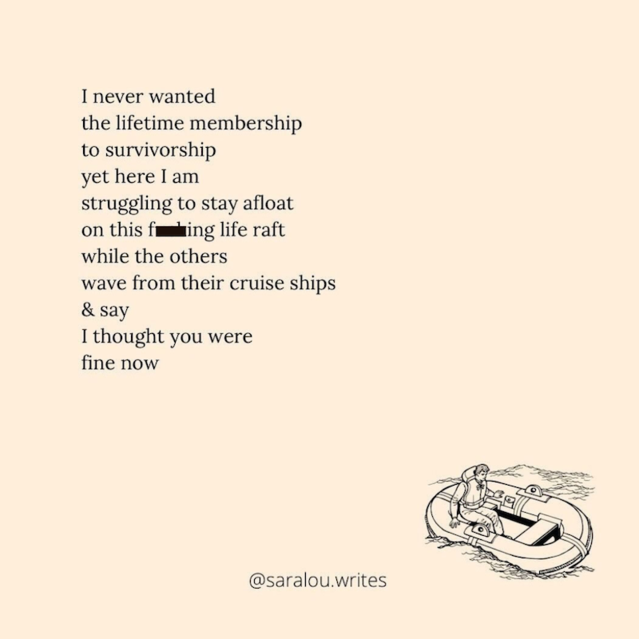Loneliness
What Does It Mean to Be a Cancer Survivor?
Reconsidering how we talk about survivorship.
Posted June 5, 2022 Reviewed by Abigail Fagan
Key points
- A “cancer survivor” is defined as a patient living “from the moment of diagnosis and for the balance of his or her life.”
- The term “survivor” may not reflect the experience of many who continue to struggle with the consequences of a cancer diagnosis.
- Supporting those with cancer means shifting from blanket terms to honoring the unique experience of individuals.

Today, June 5th, 2022 is National Cancer Survivor’s Day. For 35 years, the first Sunday in June has been identified as a day to celebrate and recognize cancer survivors as well as raise awareness of the ongoing challenges that survivors face.
What exactly is meant by the term “cancer survivor”? The National Coalition for Cancer Survivorship defines “cancer survivor” as a patient living “from the moment of diagnosis and for the balance of his or her life, regardless of the ultimate cause of death.1” Although this term is commonly used to describe anyone with a history of cancer, there are many who feel this term doesn't fit their experience.
The experience of cancer is incredibly varied, and as a result, identifying one term as a “catch-all” to describe it can be problematic. Using a blanket term such as “cancer survivor” cannot possibly capture the different phases and stages of cancer treatment and post-cancer life. A 2019 study by Berry et al.2 supports this — their interviews with people with a diagnosis of cancer found that those currently undergoing treatment and those with metastatic disease were much less likely to identify with the term “cancer survivor.” Others, however, (usually younger people with earlier stage disease), found the term empowering, representing a challenge that has been overcome and a sign of hope for those newly diagnosed.
What “survivorship” entails for a particular individual is likely closely related to their personal experience of their diagnosis and treatment. As one participant in the above referenced study stated:
“The term cancer survivor implies, to me at least, that a person has withstood all aspects of the treatment and is alive and flourishing. That is not always true since a cancer diagnosis often affects the quality of life either physically and/or emotionally for the duration of a person’s life. Many people live with a post-traumatic stress syndrome while dealing with a cancer diagnosis.”
“Late effects” of cancer treatment — defined as the impact of treatment that can last months or even years beyond the completion of treatment — are unfortunately common among those who have been treated for cancer. Symptoms like fatigue, insomnia, pain, and emotional consequences from the disease and its treatment have an ongoing impact that highlights the challenge of identifying with the term “cancer survivor.” The concept of survivorship, then, rather than being an opportunity for celebration, can be a vulnerable and lonely idea for many. While some individuals diagnosed with cancer may feel free to celebrate the end of treatment and a return to “normal,” there are millions that either may never be able to stop treatment, experience these late effects post-treatment, or simply, don't identify with the term “survivor.”
When we consider how best to support those navigating cancer, language matters. As we learn more about the emotional needs and quality of life concerns of those who have been diagnosed with and treated for cancer, it is important to reconsider the use of simplistic terms such as “cancer survivor.” The language we use will keep evolving, and perhaps some day, we won't be calling it Survivor's Day at all. Although it is clear the current label may not be a fit for everyone, my hope is that this day can be a reminder to honor the unique experience of each individual coping with a diagnosis of cancer.

References
Rowland JH, Hewitt M, Ganz PA. Cancer survivorship: a new challenge in delivering quality cancer care. J Clin Oncol. 2006;24(32):5101–5104.
Berry, L. L., Davis, S. W., Godfrey Flynn, A., Landercasper, J., &
Deming, K. A. (2019). Is it time to reconsider the term “cancer survivor”? Journal of Psychosocial Oncology, 37(4), 413–426. https://doi
.org/10.1080/07347332.2018.1522411.


